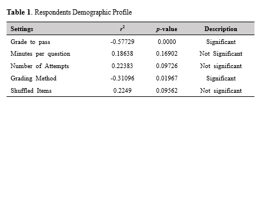Are Quiz Configurations Affecting Student Performance in an Online Learning Environment?
DOI:
https://doi.org/10.69478/BEST2025v1n1a008Keywords:
Digital Assessment, Moodle, Online Learning, Quiz Configuration, Student PerformanceAbstract
This study investigates the impact of quiz configuration settings on student performance in a Moodle-based online learning environment. With the increasing reliance on Learning Management Systems (LMS) for digital instruction and assessment, understanding how configurable quiz parameters influence learning outcomes has become crucial. The research analyzes 56 quiz records from five online courses offered through the ourSOUL platform at Silliman University. Key quiz settings examined include time per question, number of attempts, grading methods, item shuffling, and the presence of a grade-to-pass threshold. Using descriptive statistics, correlation analysis, and multiple regression, the study reveals that the presence of a passing grade and the grading method significantly correlate with student scores. Specifically, quizzes with a defined grade-to-pass threshold were associated with higher performance. Other settings, such as time allocation and number of attempts, showed weaker or non-significant associations. The findings highlight the role of intentional assessment design in shaping learner outcomes and provide evidence-based recommendations for educators and institutions. By aligning quiz settings with pedagogical goals, digital assessments can become more effective tools for engagement, feedback, and performance enhancement. This study contributes to the growing literature on data-informed practices in online education and encourages further exploration of how LMS features can be optimized for student success.
References
Commission on Higher Education (CHED), “Guidelines on the Implementation of Flexible Learning,” CHED Memorandum Order No. 4, Series of 2020, https://chedro3.ched.gov.ph/wp-content/uploads/2020/10/CMO-No.-4-s.-2020-Guidelines-on-the-Implementation-of-Flexible-Learning.pdf
M. Dougiamas, P. C. Taylor, “Moodle: Using Learning Communities to Create an Open Source Course Management System,” in the Proceedings of ED-MEDIA 2003—World Conference on Educational Multimedia, Hypermedia & Telecommunications, D. Lassner & C. McNaught (Eds.), Association for the Advancement of Computing in Education (AACE), Honolulu, Hawaii, USA, 2003, pp. 171-178, https://www.learntechlib.org/primary/p/13739.
A. Al-Azawei, P. Parslow, K. Lundqvist, “Investigating the Effect of Learning Styles in a Blended E-learning System: An Extension of the Technology Acceptance Model (TAM),” Australasian Journal of Educational Technology, vol. 33, no. 2, 2017, https://doi.org/10.14742/ajet.2741.
S. P. H. W. Gamage, J. R. Ayres, M. B. Behrend, E. J. Smith, “Optimising Moodle Quizzes for Online Assessments,” International Journal of STEM Education, vol. 6, August 2019, https://doi.org/10.1186/s40594-019-0181-4.
A. El-Hashash, “Weekly Quizzes Reinforce Student Learning Outcomes and Performance in Biomedical Sciences In-course Assessments,” Open Journal of Educational Research, vol. 2, no. 4, June 2022, pp. 168-178, https://doi.org/10.31586/ojer.2022.273.
S. Gürkan, H. Çiğdem, “Formative Quizzes in the Learning of Sensors and Transducers: Online vs. Paper Based,” Computer Applications in Engineering Education, vol. 30, no. 6, September 2022, pp. 1919-1930, https://doi.org/10.1002/cae.22565.
M. C. Bell, P. M. Simone, L. C. Whitfield, “Failure of Online Quizzing to Improve Performance in Introductory Psychology Courses,” Scholarship of Teaching and Learning in Psychology, vol. 1, no. 2, 2015, pp. 163-171, https://doi.org/10.1037/stl0000020.
R. C. Thomas, C. R. Weywadt, J. L. Anderson, B. Martinez-Papponi, M. A. McDaniel, “Testing Encourages Transfer Between Factual and Application Questions in an Online Learning Environment,” Journal of Applied Research in Memory and Cognition, vol. 7, no. 2, 2018, pp. 252-260, https://doi.org/10.1016/j.jarmac.2018.03.007.
K. P. Nuci, R. Tahir, A. I. Wang, A. S. Imran, “Game-based Digital Quiz as a Tool for Improving Students’ Engagement and Learning in Online Lectures,” IEEE Access, vol. 9, June 2021, pp. 91220-91234, https://doi.org/10.1109/access.2021.3088583.
S. Mo, “An Exploratory Study of Intrinsic & Extrinsic Motivators and Student Performance in an Auditing Course,” American Journal of Business Education (Ajbe), vol. 4, no. 2, February 2011, pp. 19-26, https://doi.org/10.19030/ajbe.v4i2.3558.
K. Belogianni, A. Ooms, A. Lykou, D. Nikoletou, H. J. Moir, “An Online Game-based Intervention Using Quizzes to Improve Nutrition and Physical Activity Outcomes Among University Students,” Health Education Journal, vol. 82, no. 6, June 2023, pp. 636-650, https://doi.org/10.1177/00178969231179032.
F. Meo, C. Martí-Ballester, “Effects of the perceptions of online quizzes and elec-tronic devices on student performance,” Australasian Journal of Educational Technology, vol. 36, no. 1, January 2020, pp. 111-125, https://doi.org/10.14742/ajet.4888.
M. D. Ryan, S. A. Reid, “Impact of the Flipped Classroom on Student Performance and Retention: A Parallel Controlled Study in General Chemistry,” Journal of Chemical Education, vol. 93, no. 1, October 2015, pp. 13-23, https://doi.org/10.1021/acs.jchemed.5b00717.

Downloads
Published
Issue
Section
Categories
License
Copyright (c) 2025 Jade O. Montemayor, Dave E. Marcial (Author)

This work is licensed under a Creative Commons Attribution-NonCommercial 4.0 International License.



